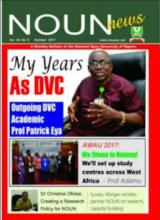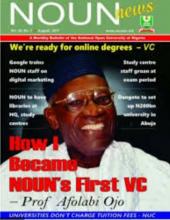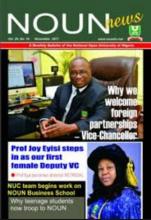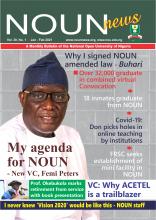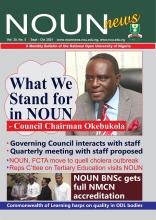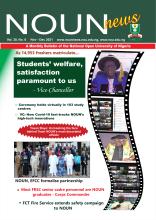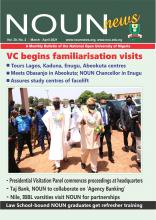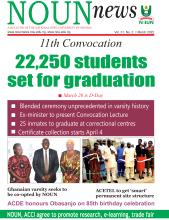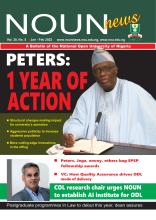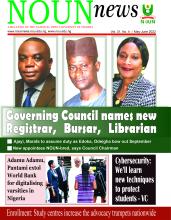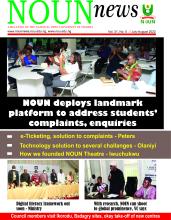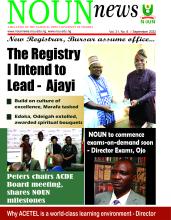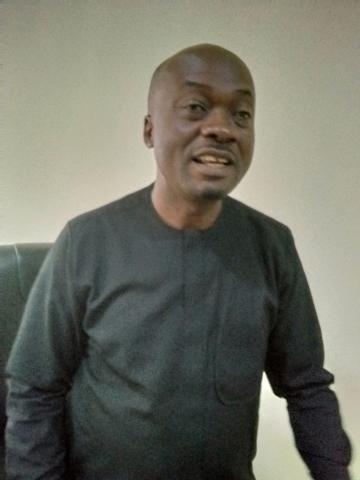
The Acting Director, Directorate of Information and Communication Technology (DICT), National Open University of Nigeria (NOUN), Dr. Francis Osang, has announced the successful upgrade of a campus-wide internet connectivity at the NOUN headquarters and some study centres to Fibre Optic system.
Osang said this will enhance a fast and free internet browsing for staff, students and guests as well as meet the digital demand.
In an interview with the NOUN News correspondent at his office, the director highlighted the benefits of the project, saying that having the Fibre Optic connection is very expensive.
“Most people use radio connection, some use vista but the most expensive and reliable is Fibre Optic because it is transmitted with the speed of light,” he said.
Osang disclosed that this milestone achievement recorded at the headquarters and 27 study centres is phase 1 of the project which is aimed at providing fast and seamless internet connectivity to all staff, students and the guests.
“What this translates to is that the headquarters and these 27 study centres will have very fast internet connectivity,” he said.
He said unlike other types of connection which can be affected by weather, Fibre Optic connection is very reliable and safer.
According to him, “It would enhance the productivity of staff. Those who spend much on buying data to do their jobs will not do so anymore. With this connection in our campuses, work load will become more manageable.”
Osang explained that it will also go a long way in assisting the academic staff in their duties in the availability to carry out research and facilitation, just as it would also help the academic staff with zoom link studies.
“The era of not having data for the academic staff will be a thing of the past. It would enable the lecturers to have interactions with their students as much time as possible. It would enhance the discussion forum of lecturers and students. Lecturers would be able to provide answers to questions for their students immediately,” he explained.
The Acting Director said having been head of the computer department "what we observe is poor attendance during facilitation and this is poorly so due to students not having data.
“But with this in place, students can simply go to these study centres, have their lectures, participate, and carry out their assignments since there's internet on campus."
The ICT Director said the Vice-Chancellor, Prof. Olufemi Peters has made the usage of internet free for the benefit of staff, students and the guests in the university.
He added that what the ICT has done was to provide passwords for staff, students and guests.
"If you are our staff you will log in using your staff ID; if you are a visitor you can simply ask the security to give you access to our internet," Osang added.
On the criteria used in picking the 27 study centres that benefited in the first phase of the project, the director said it was based on geo-political zones, saying that the selection cuts across the study centres and ensured that all the zones are represented.
"The six zones are all represented. Some of the criteria was based on the study centres that belong to the university, that are not on rented facilities. It wouldn't be proper to install such expensive infrastructure on a rental property not knowing what would happen to the property. So, we considered that we should first install on buildings that belong to us," he said.
He emphasised that NOUN is driving ODL through the Fibre Optic connection for the benefit of those who are interested in distant learning.
Asked on the possibility of connecting other study centres that were not captured in the first phase of the project, the director said the second phase has been approved and would soon commence after details have been completed to enable more study centres to be captured mostly in state capitals.
Dr. Osang praised the efforts of the Vice-Chancellor for putting such infrastructure in place saying it would help students come together to interact with themselves and study together.
He said “unlike when students can stay in their different houses or outside the campus, the new internet connection will bring out students to campuses more regularly because they want to browse and the internet is free.”
He said the project is being funded by TETfund as a direct intervention.
- Log in to post comments
- 315 views

